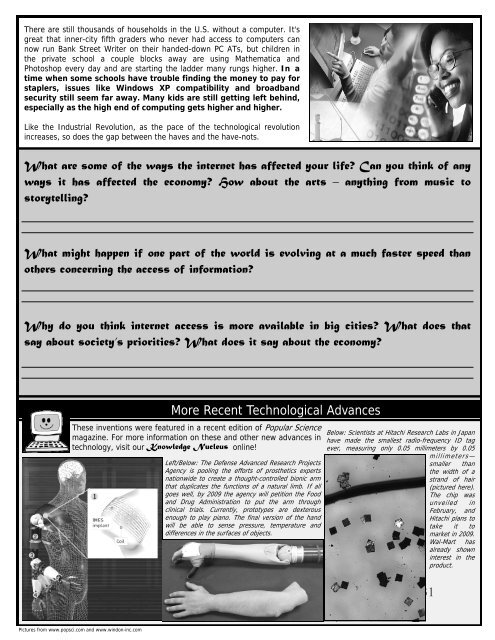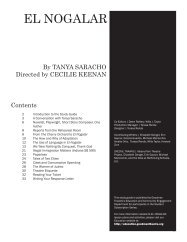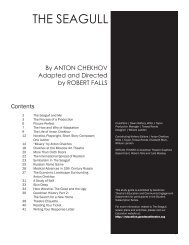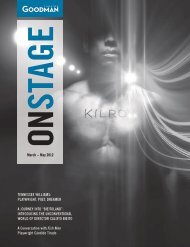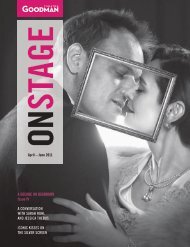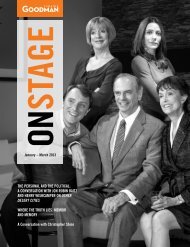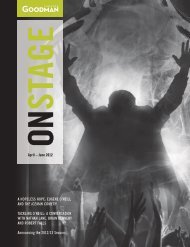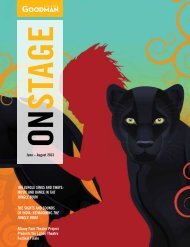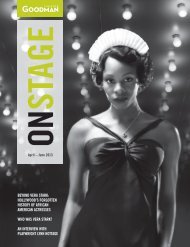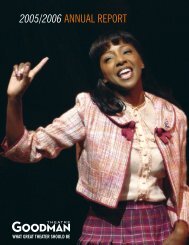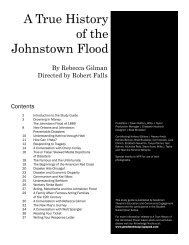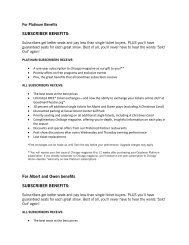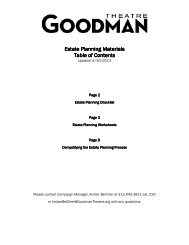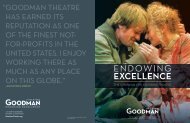A Christmas Carol 2007 Study Guide - Goodman Theatre
A Christmas Carol 2007 Study Guide - Goodman Theatre
A Christmas Carol 2007 Study Guide - Goodman Theatre
You also want an ePaper? Increase the reach of your titles
YUMPU automatically turns print PDFs into web optimized ePapers that Google loves.
There are still thousands of households in the U.S. without a computer. It's<br />
great that inner-city fifth graders who never had access to computers can<br />
now run Bank Street Writer on their handed-down PC ATs, but children in<br />
the private school a couple blocks away are using Mathematica and<br />
Photoshop every day and are starting the ladder many rungs higher. In a<br />
time when some schools have trouble finding the money to pay for<br />
staplers, issues like Windows XP compatibility and broadband<br />
security still seem far away. Many kids are still getting left behind,<br />
especially as the high end of computing gets higher and higher.<br />
Like the Industrial Revolution, as the pace of the technological revolution<br />
increases, so does the gap between the haves and the have-nots.<br />
What are some of the ways the internet has affected your life? Can you think of any<br />
ways it has affected the economy? How about the arts – anything from music to<br />
storytelling?<br />
What might happen if one part of the world is evolving at a much faster speed than<br />
others concerning the access of information?<br />
Why do you think internet access is more available in big cities? What does that<br />
say about society’s priorities? What does it say about the economy?<br />
More Recent Technological Advances<br />
These inventions were featured in a recent edition of Popular Science<br />
magazine. For more information on these and other new advances in<br />
technology, visit our Knowledge Nucleus online!<br />
Left/Below: The Defense Advanced Research Projects<br />
Agency is pooling the efforts of prosthetics experts<br />
nationwide to create a thought-controlled bionic arm<br />
that duplicates the functions of a natural limb. If all<br />
goes well, by 2009 the agency will petition the Food<br />
and Drug Administration to put the arm through<br />
clinical trials. Currently, prototypes are dexterous<br />
enough to play piano. The final version of the hand<br />
will be able to sense pressure, temperature and<br />
differences in the surfaces of objects.<br />
Below: Scientists at Hitachi Research Labs in Japan<br />
have made the smallest radio-frequency ID tag<br />
ever, measuring only 0.05 millimeters by 0.05<br />
millimeters—<br />
smaller than<br />
the width of a<br />
strand of hair<br />
(pictured here).<br />
The chip was<br />
unveiled in<br />
February, and<br />
Hitachi plans to<br />
take it to<br />
market in 2009.<br />
Wal-Mart has<br />
already shown<br />
interest in the<br />
product.<br />
31<br />
Pictures from www.popsci.com and www.windon-inc.com


